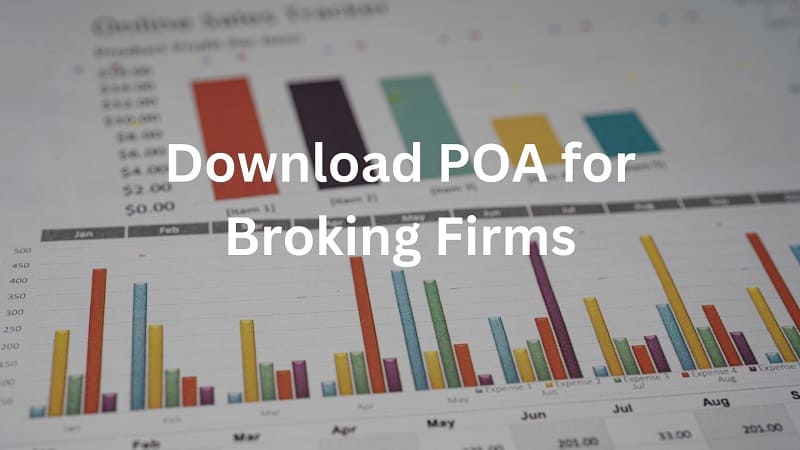Introduction
In the realm of financial management, the Power of Attorney (POA) holds a distinctive role, enabling individuals to delegate authority and streamline transactions. When it comes to demat accounts, the POA format becomes a powerful tool, providing convenience and flexibility. In this blog, we will explore the significance of the Power of Attorney in the context of demat accounts, its format, and the advantages it brings to investors.
Understanding the Power of Attorney for Demat Accounts:
A Power of Attorney for a demat account is a legal document that grants a trusted individual, known as the attorney, the authority to operate the demat account on behalf of the account holder. This authority extends to various actions, including buying or selling securities, managing investments, and handling administrative tasks related to the demat account.
The Format of Power of Attorney for Demat Account:
The POA format for a demat account typically includes the following key elements:
Details of the Account Holder:
- Full name and address of the account holder.
- Demat account number and other relevant identification details.
Appointment of Attorney:
- Full name and address of the appointed attorney.
- Clear and specific language detailing the powers delegated to the attorney.
Scope of Authority:
- A comprehensive list of actions the attorney is authorized to undertake on behalf of the account holder.
- Clauses specifying whether the authority is limited or general.
Duration of Power of Attorney:
- The timeframe for which the Power of Attorney is valid.
- Any provisions for its revocation or extension.
Signatures and Notarization:
- Signatures of both the account holder and the appointed attorney.
- Notarization to validate the authenticity of the document.
Download POA for Broking Firms
The Power of Convenience:
Efficient Trading and Transactions:
- With a POA in place, the attorney can swiftly execute trades and manage transactions on behalf of the account holder, reducing the time and effort required.
Timely Decision-Making:
- Delegating authority to a trusted individual ensures that investment decisions can be made promptly, especially in situations where immediate action is required.
Safeguarding Investments:
- In cases where the account holder is unavailable or incapacitated, the attorney can step in to safeguard investments and manage the demat account seamlessly.
Considerations and Caution:
Trust and Transparency:
- It is crucial to appoint an attorney whom the account holder trusts implicitly. Transparency in communication ensures a smooth and secure financial collaboration.
Understanding the Terms:
- Before signing any Power of Attorney, it’s imperative for the account holder and the appointed attorney to thoroughly understand the terms, limitations, and responsibilities outlined in the document.
Conclusions
In the realm of demat accounts, the Power of Attorney format emerges as a key instrument, offering both convenience and strategic advantages. As investors navigate the complexities of financial management, leveraging the power of attorney can unlock a world of possibilities, ensuring that their investments are managed with agility and prudence.
Remember, seeking legal advice and understanding the specific terms and conditions of the Power of Attorney is essential before proceeding. The Power of Attorney format is a potent tool, and when used wisely, it can significantly enhance the efficiency and effectiveness of managing demat accounts.
.
Faq Related to "Power of Attorney Format for Demat Account"
A Power of Attorney for a demat account is a legal document that grants an appointed individual (the attorney) the authority to operate the demat account on behalf of the account holder. This authority extends to various actions, including trading, managing investments, and handling administrative tasks related to the demat account.
A POA streamlines the management of your demat account by allowing a trusted individual to make transactions and decisions on your behalf. It is particularly beneficial in situations where immediate action is required or when the account holder is unavailable.
The format typically includes details of the account holder and the appointed attorney, a clear scope of authority specifying the actions the attorney is authorized to take, the duration of the POA, and signatures of both parties. The document may also be notarized for validation.
Yes, the Power of Attorney can be customized to include specific limitations or restrictions on the authority granted to the appointed individual. This ensures that the account holder retains control over certain aspects of the demat account.
While notarization is not always mandatory, it adds an extra layer of authenticity to the document. Some financial institutions may require notarization for the POA to be considered valid.
The powers delegated can vary and may include the ability to buy or sell securities, manage investments, and perform other administrative tasks related to the demat account. The specific powers are outlined in the document based on the preferences of the account holder.
Yes, a Power of Attorney can typically be revoked by the account holder at any time. It is essential to follow the procedures outlined in the original POA document or seek legal advice to ensure proper revocation.
It is crucial to appoint an attorney whom the account holder trusts implicitly. Clear communication and a thorough understanding of the terms and responsibilities outlined in the POA are essential to ensure a smooth and secure financial collaboration.
Yes, the appointed attorney can act on your behalf as long as the Power of Attorney is valid. It provides flexibility for the attorney to manage the demat account, even if the account holder is capable but prefers the convenience of delegation.
Not all financial institutions require a POA, but it is a common practice for certain transactions. Check with your specific brokerage or financial institution to understand their policies regarding the use of a Power of Attorney for demat accounts.















